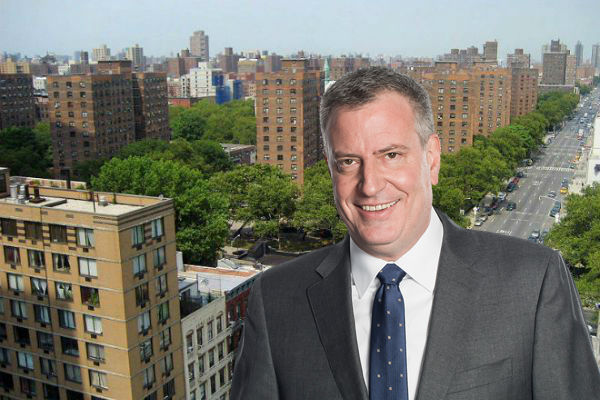 Mayor Bill de Blasio and First Lady Chirlane McCray today announced two vendors have signed leases to open the City’s first two drop-off diversion centers, a significant first step towards opening the centers. Health diversion centers will offer short-term, stabilizing services for individuals with mental health and substance use needs, giving police officers a much-needed alternative to arrest or hospitalization.
Mayor Bill de Blasio and First Lady Chirlane McCray today announced two vendors have signed leases to open the City’s first two drop-off diversion centers, a significant first step towards opening the centers. Health diversion centers will offer short-term, stabilizing services for individuals with mental health and substance use needs, giving police officers a much-needed alternative to arrest or hospitalization.
The centers will be operated by Samaritan Daytop Village, at 3000 White Plains Road in the Bronx, and Project Renewal, at 179 East 116th Street in East Harlem. Each center will serve up to 25 people at a time; the City expects diversion centers to be open by late 2019.
“New Yorkers who struggle with mental health and substance abuse issues should be connected to treatment, not placed into the criminal justice system,” said Mayor de Blasio. “This agreement brings us one step closer to opening health diversion centers and making sure people who need help and aren’t a threat to others get the care they truly need.”
“Far too many people are behind bars because they couldn’t get the mental health care they needed. These health diversion centers will help prevent arrests, and ensure New Yorkers receive the lifesaving care they need,” said First Lady Chirlane McCray. “This new partnership between the Department of Health and Mental Hygiene and the NYPD will augment and improve the City’s public health response to the mental health and substance misuse challenges in New York.”
“New Yorkers suffering from mental illness and addiction have been neglected and criminalized for far too long, and these centers represent a positive step in providing access to emergency services for people who are in crisis. I still believe that more can be done to address long term solutions and given that we are currently working to reduce the number of people incarcerated and close Rikers, we should expand on these efforts to search for alternatives for people suffering from mental illnesses who are in jail or would otherwise wind up in jail. I support the proposed opening of these short term care centers, and look forward to working with the administration to help not only those individuals who need a safe place to get stable and connect to services, but also to provide the kinds of services that enable people who are sick to get better and stay better,” said Council Speaker Corey Johnson.
The total investment for both centers will be about $9.5 million annually, with a plan to divert approximately 2,400 people yearly. Each center will cost approximately $4.7 million each year.
First announced in 2014 in the Mayor’s Task Force on Behavioral Health and the Criminal Justice System Action Plan, the diversion centers will serve people referred by the NYPD who need support and services for mental illness, substance use, and health and social issues. This is a voluntary program – there is no mandate to receive services. The centers will offer a range of clinical and non-clinical services, including overnight beds and basic needs, such as food, laundry and showers. Clinical services will include health and behavioral health assessments; counseling; advocacy; peer-to-peer engagement services; medication; medically-supervised substance use stabilization and withdrawal management; and naloxone training and distribution. Peers will play a central role in the approach to engagement and support at the diversion centers. The Action Plan has helped to reduce the number of people with a mental health diagnosis in city jails by 10 percent between 2014 and 2017.
“This is an extremely welcomed change for the NYPD,” said NYPD Deputy Chief Terri Tobin. “So often, in the middle of the night, officers encounter someone who is in need of help—whether it be mental illness or substance abuse—and these Health Diversion Centers are a place where we can bring that person for services. We do not want the criminal justice system to be the default, and the Health Diversion Centers will be another important intervention New York City provides to those in need.”
“This is an exciting milestone as we work towards opening diversion centers in New York City,” said Acting Health Commissioner Dr. Oxiris Barbot. “Diversion centers are a way to intervene at a critical moment – interaction with the police – and connect New Yorkers with mental health or substance use issues to care rather than arrest. They will help us break the cycle of criminal justice involvement for thousands of New Yorkers each year.”
“We are pleased by this important step and proud to have been part of the Behavioral Health Task Force, along with the DOHMH and multiple others, which helped launch this initiative,” said Elizabeth Glazer, Director of the Mayor’s Office of Criminal Justice. “This will broaden the options available to law enforcement when responding to individuals with behavioral health needs whose behavior violates the law.”
The new health diversion centers will operate 24/7 with a no-refusal policy for individuals brought in by the police. Length of stay will vary from hours to days depending on the person’s needs, with a cap of five days. When there is clinical need, such as more supervision of withdrawal services, the stay can be extended to 10 days. Once the client is stabilized, the centers will connect them to health care, social services and other supports. The centers will not be used as a replacement for permanent housing or long-term shelter for homeless individuals.
The model of the centers was developed by the Department of Health and Mental Hygiene, in consultation with partner agencies. Through ThriveNYC, the most comprehensive mental health plan in the country, the centers offer an innovative alternative to jail or hospitals, and they are strategically paired with the NYPD’s Crisis Intervention Training (CIT). CIT enables officers to better recognize and manage the behaviors and symptoms related to a mental illness and substance use crisis.
Since 2015, nearly 11,000 NYPD officers across the City have received CIT training.
“Diversion centers will provide an alternative to arrest and hospitalization for individuals with mental health needs and/or substance use disorder. New Yorkers battling these conditions will be provided with crucial services, such as behavioral health assessments, counseling, and medication assisted treatment,” said Council Member Diana Ayala, Chair of the City Council’s Committee on Mental Health, Disabilities, and Addiction. “I look forward to the opening of both centers, as this evidence-based model will break the cycle of arrest for many individuals and help them achieve stability.”
“I represent one of the poorest districts in the City, and among some of the highest rates of incarceration. This new Diversion Center will help provide a safe alternative to arrest instead of a criminal record that can be devastating to the members of my community,” said Council Member Ritchie Torres.
“The opening of the City’s first two Health Diversion Centers delivers on the recommendations of the 2014 Behavioral Health Task Force and provides first responders with a new health-focused option when encountering New Yorkers in crisis,” said Council Member Donovan Richards, chair of the Committee on Public Safety. “Relying on the criminal justice system to solve mental illness and addiction has not and will never work, which is why the intervention of these new centers is so important to helping New York City address these issues with a smarter, more humane approach. I’d like to thank Mayor de Blasio, First Lady McCray, Health Commissioner Barbot, and NYPD Commissioner O’Neill for their dedication to finding a better solution for people in crisis.”
“Project Renewal is honored to operate one of the City’s first diversion centers and use this new model of care to intervene with individuals who are in crisis through intensive engagement and support services,” said Eric Rosenbaum, President & CEO of Project Renewal. “For 52 years, Project Renewal has been an innovator in developing services to help New Yorkers overcome homelessness, mental health challenges, and substance use disorders. We are eager to use our vast expertise to help guests at the diversion center achieve stability and get on the path to renewal. We look forward to working with the NYC Department of Health and Mental Hygiene, the New York City Police Department, and our community partners in East Harlem on this innovative program.”
“Samaritan Daytop Village is honored to have been chosen to operate one of two groundbreaking and innovative diversion centers,” said Mitchell Netburn, President & CEO of Samaritan Daytop Village. “Mayor de Blasio and First Lady McCray’s laudable vision is to provide a temporary, safe and supportive environment for vulnerable New Yorkers where they will receive critically needed services to empower them to break the often tragic cycle of arrest, incarceration, release and re-arrest. For the first time there will be a viable community-based alternative to incarceration for people living with mental illness and substance use disorder. Of equal importance, the centers will be assets to their communities by helping to address long-standing quality of life issues.”
Ann-Marie Louison, CASES’ Chief Strategic Initiatives Officer, said “CASES commends the Mayor on the launch of New York City’s first Public Health Diversion Centers. This is another example of New York City’s commitment to preventing people with behavioral health needs and who are charged with low-level crimes from unnecessary, harmful, and expensive stays in city jails. Each year, CASES staff work with thousands of men, women, and young people with mental health and substance use issues who have become caught up in the court system and/or who are detained at Rikers Island. We are thrilled that the NYPD will now have safe options to immediately get these individuals—including those in crisis as the result of opioid use—the help they need as opposed to taking them to jail.”
“Drop-off diversion centers are a terrific initiative that respond to the medical health, substance use, and mental health needs of specific individuals,” said Aaron Charlop-Powers, Director of Diversion, Center for Court Innovation. “Along with the Project Reset and HOPE/CLEAR early diversion programs, diversion centers are one more way that New York City is innovating justice by offering meaningful, proportionate community-based responses to low-level offending and support to people in need, rather than the more punitive traditional outcomes of conviction and confinement.”
“We can all agree that people experiencing a mental health crisis need support, not jail. We are pleased New York City is implementing this forward-thinking approach and will connect New Yorkers in crisis to services that can support their wellness and recovery. By providing police with alternatives to hospitalization or jail — neither of which meet the needs of those in crisis — we can make sure people get connected to the kinds of care they need. We look forward to partnering with the diversion centers to offer our full array of peer support programs to those in crisis, and their family members,” said Matt Kudish, Executive Director of the National Alliance on Mental Illness of New York City (NAMI-NYC).
Become a Harlem Insider!
By submitting this form, you are consenting to receive marketing emails from: . You can revoke your consent to receive emails at any time by using the SafeUnsubscribe® link, found at the bottom of every email. Emails are serviced by Constant Contact








